Natural disasters like hurricanes and the consequential flooding following a storm can be especially damaging for older adults for various reasons. Many seniors have mobility challenges, which makes evacuation harder. A significant number of older adults also have chronic health conditions, which makes access to medication and healthcare challenging during a natural disaster.
Historically, seniors have had higher mortality rates during natural disasters like hurricanes. During Hurricane Katrina in 2005, about 75% of fatalities were among Americans aged 60 and above, according to a report from the AARP.
Coastal cities plagued by hurricanes and flooding are also where many senior citizens flock for retirement. Coastal communities are increasingly exposed to more intense and frequent hurricanes, accelerated by sea-level rise and prolonged tidal inundation. Yet, these communities are so often a preferred retirement destination for older adults, who, whether they know it or not, are specifically vulnerable to flooding and extreme weather events.
The unique physical and psychosocial challenges of older adults aged 65 and over can affect their level of preparedness, capacity to cope with, and ability to respond and recover from severe hurricane and flooding disasters.
This resource guide will highlight the essential preparedness strategies older adults must know to stay safe and healthy before and after floods and hurricanes.
Essential stats on seniors and hurricanes/floods
Nearly 40% of Americans (123.3 million people) live in Coastal Shoreline Counties, including many senior citizens who are at increased risk from hurricanes and floods. – NOAA
Aging Coastal Population:
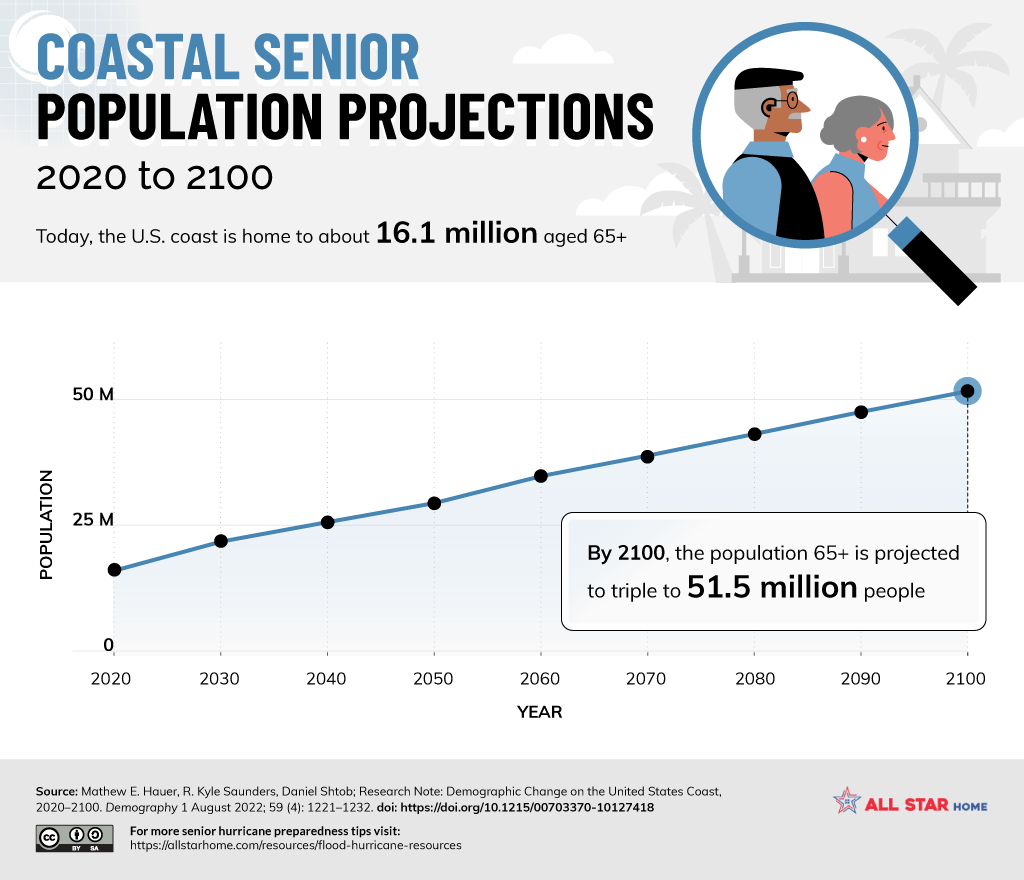
High-tide flooding is now 300% to more than 900% more frequent than it was 50 years ago.
This statistic doesn’t bode well for the increasing share of older adults living in coastal communities. By 2100, it’s estimated that adults older than 65 living in coastal communities will triple to 51.5 million.
Source: Climate.gov
Older adults also make up the majority of reported weather disaster-related fatalities.
Seventy-five percent of Hurricane Katrina fatalities in 2005 were among Americans aged 60 and over, and 75% of Hurricane Ian fatalities accounted for Americans 60 and over, as well.
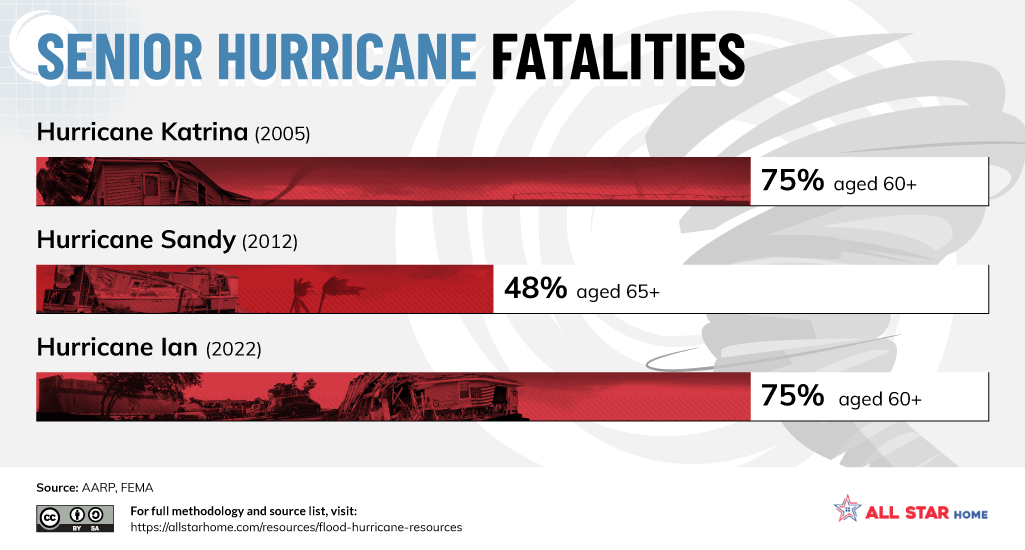
Source: AARP, FEMA
The risk for seniors is not limited to the disaster situation in the short term. According to one study, in the 30 to 90 days following hurricane disasters, elderly nursing home residents experience increased morbidity and mortality.
Hurricane definitions, what you need to know
Hurricanes form over oceans and bring storm surges to land. With extremely high wind, torrents of rain, and ocean water in a whirl, these storms are often partnered with extreme and dangerous flooding.
If you live in a hurricane-prone area, it’s important to understand the differences between the following meteorological definitions:
Hurricane watch:
- There is a possibility of hurricane-like conditions in the area.
- The storm’s wind speed may reach 74 mph or higher.
- The watch is announced 48 hours before the anticipated onset of the storm.
- A watch indicates a threat.
- This is when residents should begin the final preparation for the onset of the hurricane.
Hurricane warning:
- There is an expectation that hurricane-like conditions are expected in the area.
- The storm’s wind speed is likely to reach 74 mph or higher.
- The warning is announced 36 hours before the anticipated onset of the storm.
- A warning indicates expectation and urgency.
- Often residents are encouraged to evacuate at this point.
Hurricane:
- A tropical cyclone in the Northern Hemisphere.
- There is a sustained wind speed of 74 mph or higher.
- Wind speed for hurricanes can range from 74 mph to over 156 mph.
- Hurricanes rotate counterclockwise.
Hurricane quick fact: Hurricane wind speeds set them apart from tropical depressions (with wind speeds of 38 mph) and tropical storms (with wind speeds from 39-74 mph).
Additional hurricane meteorological resources:
- Glossary of Hurricane Terms – The National Hurricane Center and Central Pacific Hurricane Center
- Hurricane Categories – The National Hurricane Center and Central Pacific Hurricane Center
Hurricane & Flood Preparation Checklists for Seniors
Preparation for a hurricane disaster is crucial for everyone, but especially important for seniors.
Due to factors like mobility challenges, hearing and vision impairments, and access to life-saving medications, seniors have more unique and particular needs during natural disasters that can make staying safe especially complicated.
We’ve prepared these senior-specific hurricane safety checklists specifically catered to senior citizens to address before the storm: preparation, response, and recovery.
1) Hurricane & Flood Emergency Kit Checklist
The necessary supplies to be self-sufficient for several days can make all the difference during and after a hurricane. Especially if emergency services can’t reach you quickly.
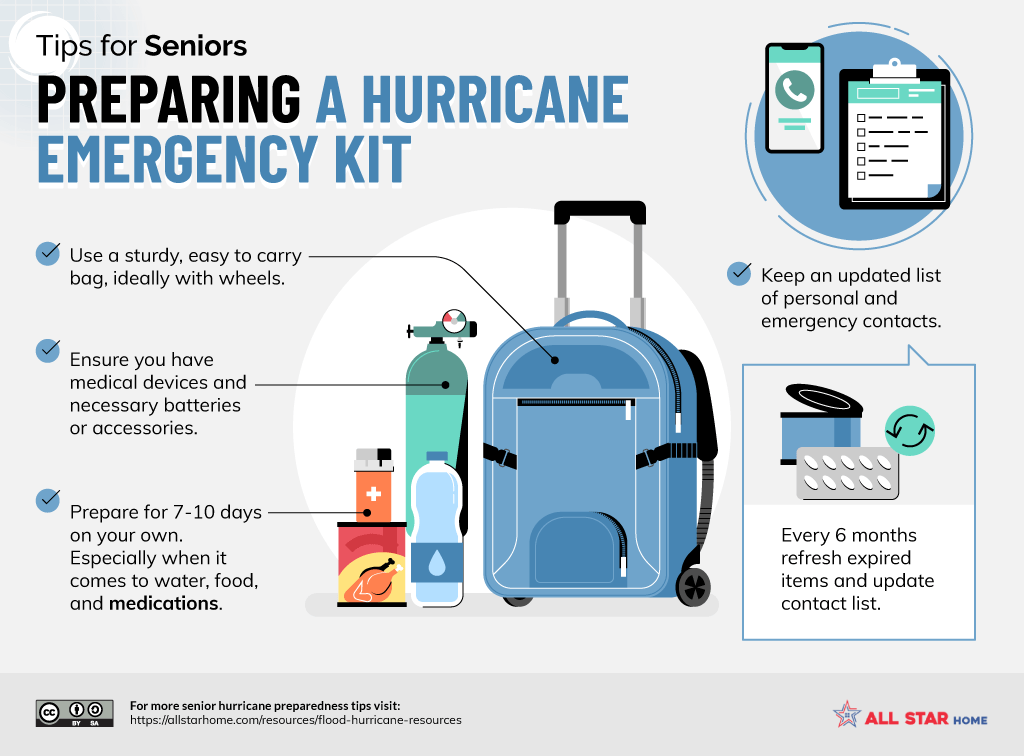
Emergency kit essentials:
- Bottled Water
- Medication
- Non-perishable Food
- Radio – solar or battery-powered
- Phone and Battery Powered Charger
- Battery-free flashlights
- First-aid Kit & Sanitation Essentials
- Clothing & Blankets
- Cash
- Toiletries & toilet paper
- Multi-tool/army knife & can opener
- Pet food & supplies
Resource links for prepping an emergency kit
2) Hurricane & Flood Important Documents Checklist
While preparing for a hurricane, have all your important documents ready. Whether you evacuate or not, having these items with you will be especially helpful should you need any medical treatment or, in the aftermath, have to file insurance claims.
Quick tip: Make digital copies of all your important documents and save them in an electronic file accessible on the cloud (from any computer). Get someone trusted to help with this and with whom you can share your password.
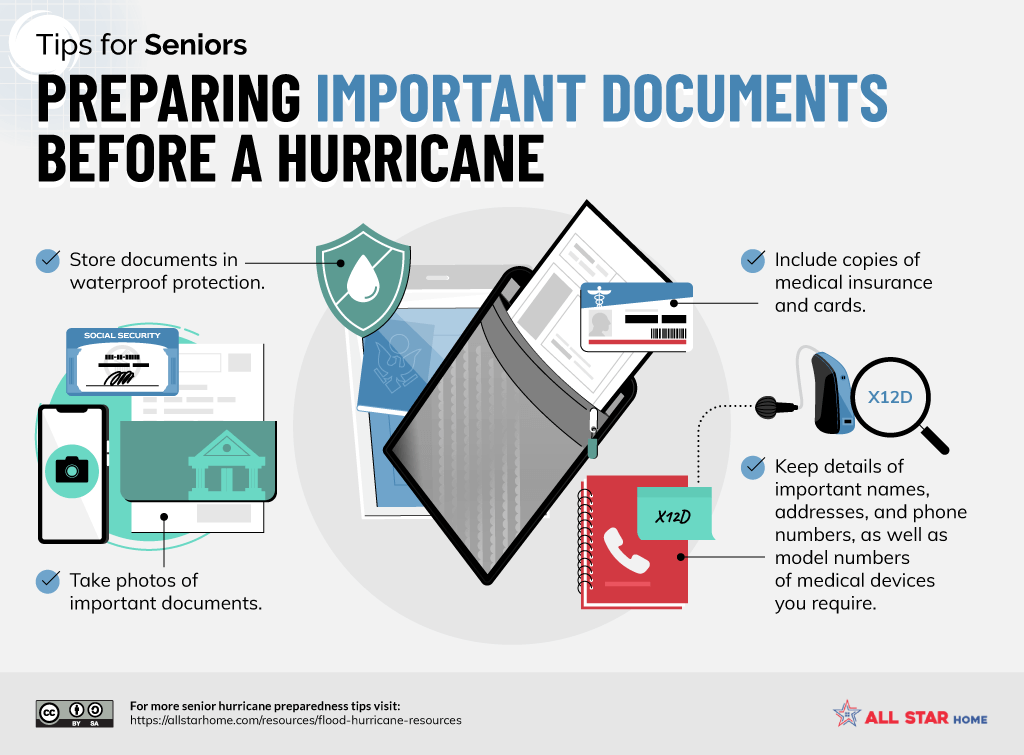
Important essential documents:
- Bank/Financial Information
- Bills
- Birth Certificates
- Credit Cards
- Green Card/ Immigration Documents
- Home or Renters insurance policy
- ID Cards
- Insurance Card
- Marriage or divorce certificate
- Medical Information
- Mortgage
- Passport
- Pet Information
- Photos
- Social Security Card
- Tax Documents
- Vaccination Card
- Wills and life insurance information
Resource links for document preparation:
- Disaster Supply Kit: Important Documents and Money
- Safeguard Critical Documents and Valuables
- Disaster Supply Kit: Important Documents and Money
3) Hurricane & Flood Home Safety Checklist
Properly securing your home can significantly reduce property damage caused by high winds, heavy rain, and flying debris. For seniors who must shelter in place, this is a crucial step to stay as safe as possible when the storm arrives.
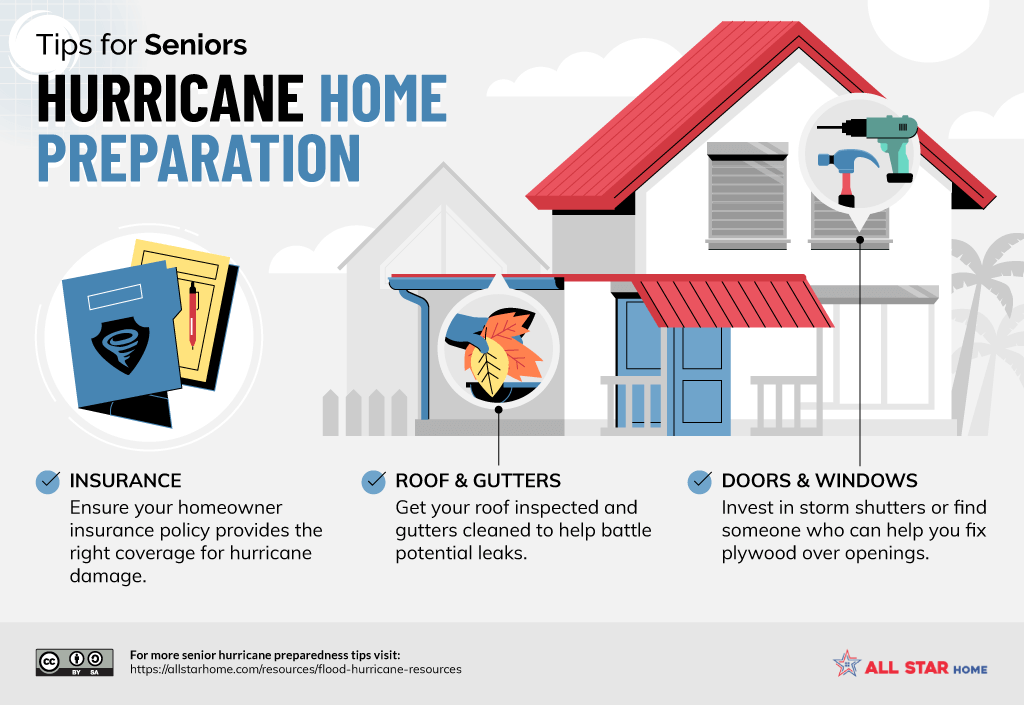
Check insurance coverage. One of the simplest steps a senior can take is to ensure home and property insurance covers both hurricane and flood damage, which may not be included in standard policies.
Clear roof and rain gutters. Routine home maintenance can become difficult to keep up with as you age. You may have to plan ahead to keep up with routine home maintenance that can keep your home safe in the event of a natural disaster like hurricanes and flooding. Regular roof inspections and cleaning of gutters and downspouts are important to prevent water buildup and potential flooding in your home.
Secure windows and doors. Install storm shutters or board up windows with plywood. Reinforce garage doors because they can be vulnerable to high winds. This tip is essential for people of all ages, but seniors may need additional help from family, friends, and community members to get it done. So, plan ahead.
More tips:
- Trim trees and secure outdoor items. Trim tree branches that could fall on your house. Secure or put outdoor furniture, decorations, trash cans, and other items that heavy winds could pick up in storage. If you have trouble doing these things yourself, enlist the help of family, friends, neighbors, or community members.
- Check your house’s structural integrity. As a long-term measure, it might be worth having a professional assess the structural integrity of your home if you live in an area frequently hit by hurricanes. They can suggest any necessary reinforcements. Doing this is especially important for older adults who may have challenges keeping up with essential home repairs and maintenance.
For additional information on how you can prepare your home before a hurricane, visit:
- Hurricane Ready-Residential – DISASTERSAFETY.ORG
- How to create a home inventory | III
- Infographic: Be Ready! Hurricanes | CDC
Hurricane & Flood Response: Should seniors evacuate or not?
Evacuation for the elderly can be complicated and even dangerous for those with serious physical disabilities.
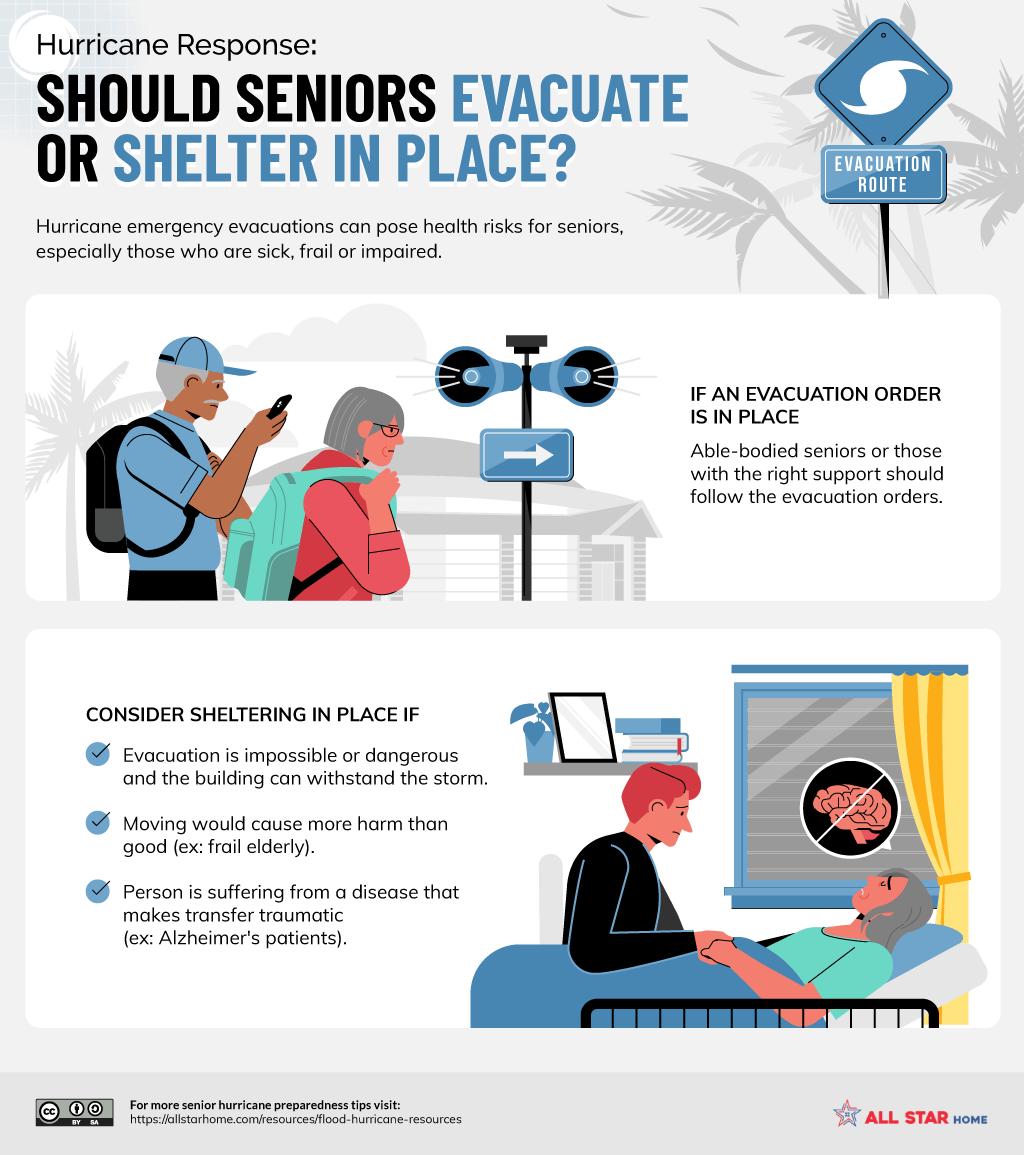
A 2011 study showed that in four hurricanes, death rates were higher among nursing home residents who were evacuated than among those who sheltered in place. A likely cause was the “transfer trauma” associated with being evacuated.
The National Fire Protection Association recommends the “RED” decision-making model: “React, Evaluate, and Decide” when deliberating an evacuation scenario. This can be applied to hurricane evacuation situations as well:
- React: Take any indication of strong wind, rainfall, or potentially threatening hazards seriously.
- Evaluate: Analyze your situation and the threat of the storm. Some questions to ask:
- Do you have a physical limitation that makes evacuation impossible?
- Do you have a mental illness that makes evacuation traumatic?
- Do you have a place to go safely and someone to help?
- Can your building withstand the wind force safely?
- Can you easily move to the second floor?
- Decide: Make one of the following two choices:
- Follow the hurricane evacuation plan, immediately.
- Stay and defend in place; for example, moving to a secure location in the home and taking proactive and defensive actions.
Hurricane & Flood Response: Evacuation preparation for seniors
Older adults face specific challenges when evacuating because of a hurricane or severe flooding. So, planning for a hurricane evacuation can reduce anxiety and confusion in what can be chaotic and stressful situations when a hurricane hits your community.
Ensure you have an evacuation support system, as it can be more challenging for older adults to evacuate alone.
Planning your support system should include the following:
- Identify your support network. Build a network of family, friends, and neighbors who can help you during an evacuation. This network should include people both within and outside the potential evacuation zone.
- Pick roles and responsibilities. Within the support network, assign specific tasks like helping with transportation, providing temporary housing, or helping with securing your home before leaving.
- Make a communication plan. Share contact information, establish a primary point of contact, and choose a common communication platform, such as a group text or social media group.
- Consider special needs. Ensure your support system is aware of any special needs you have, such as medical conditions or mobility issues, and determine how they’ll provide the necessary assistance.
Hurricane & Flood Response: How seniors can safely shelter in place
Hurricanes can change course and intensity rapidly. If you can’t evacuate, having a shelter-in-place plan is essential for your survival and safety, especially for senior citizens who may need to address specific challenges in sheltering in place.
Some essential safety tips for sheltering in place during a hurricane are:
- Choose a safe room. Choose an interior room without windows, such as a bathroom, closet, or hallway on the lowest level that isn’t prone to flooding. This room should be your safe zone during the worst part of the storm.
- Stock up on essentials. Stock up on enough non-perishable food, water, medications, and pet supplies. Also, ensure you have a manual can opener.
- Stay informed. Keep a battery-powered hand radio to listen to storm updates and emergency instructions. If you have a smartphone, ensure it’s fully charged and consider keeping a backup power source.
- Be ready for power outages. Avoid using candles due to the risk of fire. Instead, use flashlights or battery-powered lanterns.
- Stay connected. Ensure a way to communicate with family, friends, and emergency services. Texting is often more reliable and less burdensome on communication systems than calling.
Recovering: Hurricane and flooding disaster recovery for seniors
The risks of hurricanes and floods aren’t limited to disasters in the short term, especially for seniors.
According to research, in the 30 to 90 days following hurricanes, elderly nursing home residents experience an increased risk of mortality.
Factors which contribute to this, but are not limited to, are:
- Flooding
- Contaminated water
- Downed power lines
- Limited access to medical care.
Nursing home patients regularly say how important it is for senior citizens to take special care following a hurricane disaster or flood event. Disrupted routines and displacement can especially impact senior citizens following a hurricane. A 2011 study revealed that in four hurricanes, death rates were higher among nursing home residents who were evacuated than among those who sheltered in place. Researchers said the likely cause of this was “transfer trauma” associated with being evacuated.
Recovering: Impacts on senior physical health after a hurricane
During the recovery and cleanup process, the weeks and months after a hurricane present several physical health risks. These include water-borne diseases, mosquito-borne illnesses, heat illness (if air conditioning systems fail), and respiratory problems from mold growth.
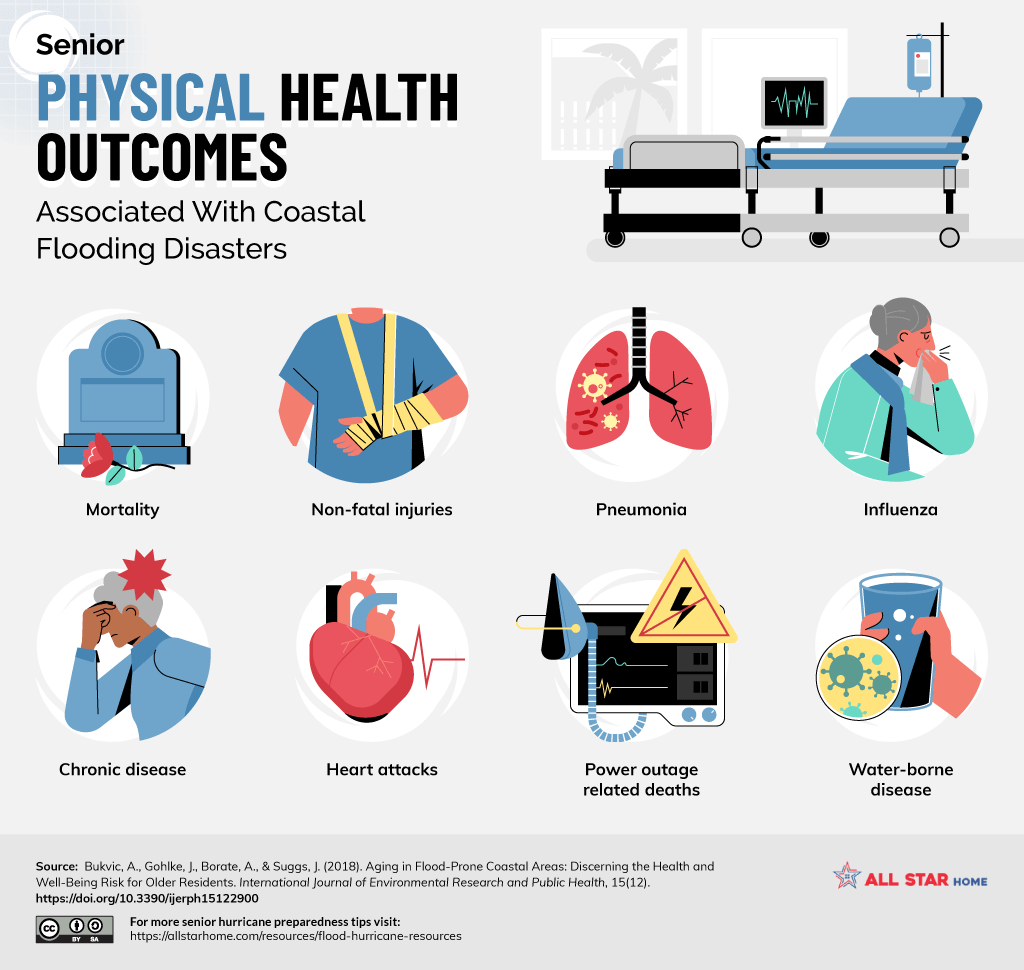
Some ways for seniors to stay physically safe after a hurricane include:
- Avoid flood waters. Stay away from flood waters because they can be contaminated and deeper than they appear. Never drive through flooded roadways.
- Beware of electrical hazards. Assume all downed power lines are live, avoid them, and report them to authorities. Also, be cautious with electrical equipment in wet conditions.
- Beware of carbon monoxide poisoning. Use generators, grills, and other gasoline or charcoal-burning devices outside and away from windows and doors to prevent the potential of carbon monoxide poisoning.
- Practice good hygiene. Wash your hands regularly to prevent infections, especially after contact with flood waters or handling debris.
- Ensure water safety. Use bottled water or boil tap water for drinking and cooking if there’s a possibility that your water supply is contaminated.
Recovering: The impacts on senior mental health after a hurricane
The trauma, stress, and disruption caused by a hurricane can have significant impacts on mental health, including sleep disturbances, anxiety, and depression.
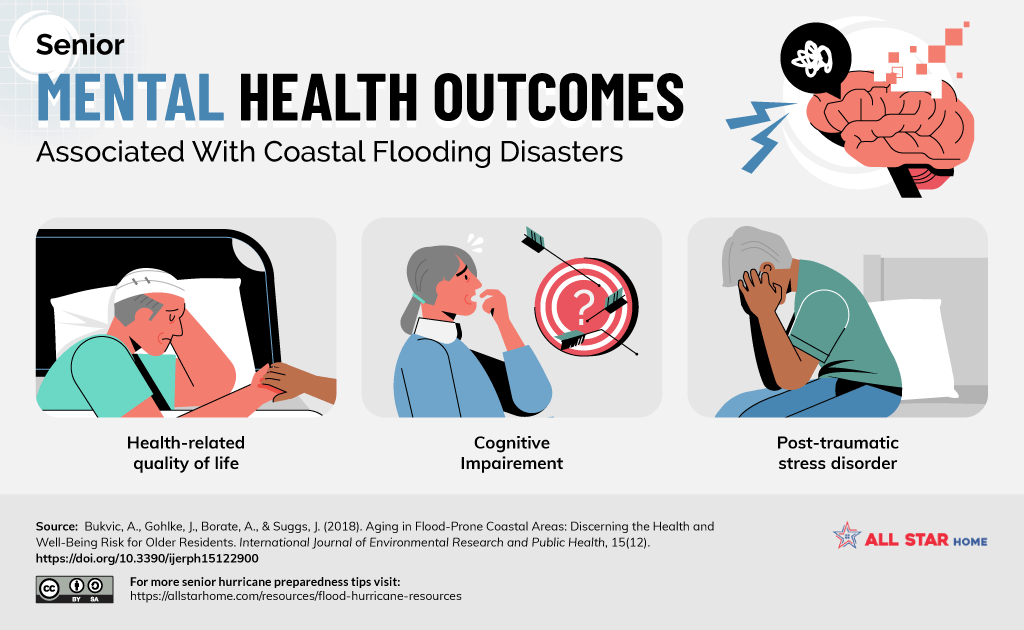
Some ways to protect your mental health following a hurricane include:
- Talking about your experience. Share your experiences and feelings with friends, family, or a support group, as talking about what you’re going through can be therapeutic and help process your emotions.
- Keep a routine. As much as possible, maintain a routine, including meal times, sleeping, and exercise. A routine provides a sense of normalcy and control. This is difficult in the aftermath of a hurricane, but any kind of routine can help.
- Focus on what you can control. Hurricanes can bring chaos, and many things may be beyond your control. So, focus on what is in your control, such as your daily activities, attitude, and mindset, instead of the factors you can’t control.
- Help others and the community. Being part of community recovery efforts in any way can provide a sense of purpose and solidarity, which can be emotionally rewarding and take your mind off the negative aspects of what happened.
- Be patient with yourself. Recovery from natural disasters and the emotions they evoke are a process. It takes time to heal from the trauma and disruption.
Nursing home residents and assisted living facilities
Preparing for a hurricane is vital to the health and security of elderly individuals living in nursing homes or assisted living facilities because of the vulnerability of its residents.
Many elderly residents depend on life-sustaining equipment that requires electricity, such as oxygen concentrators, and may need regular medical treatments that a hurricane would severely disrupt.
Nursing home patients and their families can prepare for hurricanes by:
- Stockpile essential supplies. Stockpile necessary supplies like food, water, medications, medical supplies, and generators. Ensure there are enough supplies to last for several days post-hurricane.
- Develop a family communication plan. Establish a plan to communicate with families before, during, and after the hurricane. Keep families informed about evacuation decisions, the location of residents, and how they’ll be cared for.
- Check essential legal documents. For families of patients, ensure all important documents like medical directives and power of attorney are in order and accessible.
- Be aware of community resources. Families of patients should stay up to date with community resources that can be utilized during and after emergencies, such as local shelters and aid organizations.
Additional resources:
- Emergency planning checklist for persons in long-term care facilities (CMS.gov)
- Questions to Ask a Loved One’s Care Facility About Disaster Planning
Alzheimer’s disease and dementia
Hurricanes can have significant impacts on individuals with Alzheimer’s disease and other forms of dementia.
People with Alzheimer’s thrive on routine, and the chaotic pressure of hurricanes can throw those routines off and lead to increased confusion and agitation.
Those who care for people with Alzheimer’s can prepare for hurricanes by:
- Non Removable identification. Alzheimer’s patients may wander or become disoriented, especially during evacuations or in unfamiliar environments. Make sure they have identification on them that cannot be easily removed, such as bracelets or ID tags. Identification should include their name, their caregiver’s contact information, and any essential medical information.
- Maintain routines. Try to maintain the patient’s routine as much as possible to reduce confusion and anxiety. This includes regular meal times, bedtime routines, and other familiar activities.
- Evacuate to a safe environment. If evacuating, carefully consider the safety and suitability of the evacuation destination for the patient. The environment should be as calm and quiet as possible to reduce stress and confusion.
- Provide updates and reassurance. Provide regular updates to the patient about what’s happening in a way they can understand. Offering constant reassurance can help ease a patient’s anxiety and confusion.
Additional resources:
- Preparing for Emergencies
- Hurricane Preparedness Information for Residents in the Southeast Affected by Alzheimer’s Disease
- Disaster Preparedness
Low-income communities
Hurricanes can have a severe impact on low-income communities and low-income senior citizens for several reasons. The costs associated with evacuating, like transportation, lodging, and food, can be cost-prohibitive for some low-income older adults, often leading to delayed or no evacuation. A senior citizen living on a fixed income already must face specific challenges during hurricanes and floods, but lack of financial resources can make matters worse.
Low-income senior citizens can better prepare for hurricanes by:
- Know about community resources. Know local shelters’ locations and the resources available through community centers, churches, and local government. Some areas offer assistance with transportation for evacuations.
- Network with neighbors. Build relationships with neighbors and create a community support system. Neighbors can share resources and information and help each other during emergencies like hurricanes.
- Research affordable insurance. Look into affordable insurance options, such as those offered through government programs. Even basic coverage can be helpful in the recovery process after a hurricane.
- Set aside a small emergency fund. Try to set aside a small emergency fund. Even a modest amount can help cover unexpected expenses during evacuations or in the immediate aftermath of a hurricane.
Additional resources:











